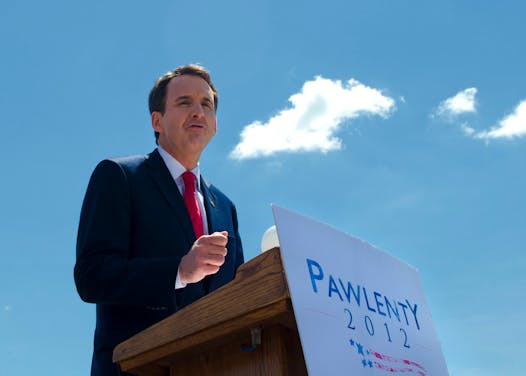Why hasn't Minnesota ever produced a U.S. president?
Listen and subscribe to our podcast: Via Apple Podcasts | Spotify | Stitcher
After declaring she's running for president in what was perhaps the most Minnesotan announcement ever — in the middle of a snowstorm — Amy Klobuchar is looking to become the first-ever North Star state native to ascend to the nation's highest office.
Minnesota has never laid the grounds for a successful presidential run, despite producing two vice presidents, three Supreme Court justices and multiple members in presidential cabinets.
That raises the question: Why has there never been a president from Minnesota? And, are there other states like us?
That's one of the questions we're taking on with Curious Minnesota, our community-driven reporting project that invites Star Tribune readers into the newsroom. To get us rolling, we're answering this question from a curious staff member.
Turns out a majority of states have never produced a president.
If you look at where presidents were born, 21 states can lay claim to at least one president.
However, several presidents are "from" different states than which they were born. For example, George W. Bush was born in Connecticut, but he's a tried-and-true Texan; Nebraska-born Gerald Ford made his name in Michigan politics; and Abraham Lincoln, Ulysses S. Grant and Barack Obama all have ties to Illinois though none were born there.
Looking at where presidents primarily made their political ascent, only 18 states make the cut.
Either way, the country's 45 presidents come from a relatively few number of states.
Geography, unsurprisingly, plays a big role in presidential elections, said Barbara Perry, the director of presidential studies at the University of Virginia's Miller Center.
East Coast states have produced the most presidents by far. But they also had more chances, Perry said, because they were the first states in the Union. Minnesota, on the other hand, didn't become a state until James Buchanan's presidency. (Zachary Taylor, the nation's 12th president, then a lieutenant colonel in the U.S. Army, commanded Fort Snelling from 1828-1829. But it's a bit of a stretch to claim him as a Minnesotan.)
Minnesota's had its fair share of shots to send a native son to the Oval Office: Six Minnesotans made serious bids for president before Klobuchar. All came up short.
Hubert Humphrey's defeat in '68 represents the state's closest attempt at the Oval Office. (Though born in South Dakota, Humphrey is as Minnesotan as they come.) Walter Mondale, the state's only other major party nominee, overwhelmingly lost in 1984 to Ronald Reagan.
Could it be some sort of Minnesota curse, similar to that of a certain purple and gold football team? Minnesota Historical Society curator Sondra Reierson says probably not.
"With Humphrey, Vietnam was really the end of him. With Mondale, Reagan was just a more attractive candidate overall. It really does come to the individual specifics of each race," she said. "I'm not sure if the individual states are really the deciding factor."
However, there could be some downsides to launching a presidential campaign here. Nascent presidential campaigns require candidates to develop a national profile and raise a ton of money. "Flyover states" like Minnesota may not be the best place for that to happen.
"Part of the answer may just simply be where Minnesota is located," said Hamline University political science professor David Schultz. "We're not a California. We're not a New York. We're not located in one of the major media markets in the United States."
Though we neighbor Iowa, the ever-important first test for candidates, Schultz said the state's proximity doesn't always pay off. Former Minnesota congresswoman Michele Bachmann, for example, dropped her 2012 presidential run after a sixth-place finish in the Iowa caucuses.
Additionally, Minnesota's "brand of politics" — what makes politicians successful on a statewide level — may not be as popular on the national level.
Minnesota's political landscape is typically less antagonistic, less partisan and less extreme, and Minnesota politicians are usually "not as colorful" as those who typically run for the country's chief executive, Schultz said
He pointed to Tim Pawlenty's failed primary campaign as a prime example. T-Paw's "nice guy" personality and more moderate political stances didn't gain support among the GOP faithful, and the former governor dropped out early in 2011.
"Minnesota Nice" just might not be what voters are looking for in a president.
"We get a little myopic in Minnesota thinking what plays well in Minnesota plays well nationally," Schultz said.
Austen Macalus is a University of Minnesota student on assignment for the Star Tribune.
---
If you'd like to submit a Curious Minnesota question, fill out the form below:
Read more Curious Minnesota stories:
Where did the term Minnesota Nice come from, and what does it really mean?
Why isn't Isle Royale a part of Minnesota?
Why does Minnesota tax Social Security benefits?
Why is Uptown south of downtown in Minneapolis?
Why can't Minnesotans figure out how to zipper merge?
What percentage of Minnesotans spend their entire lives here?
Were Minneapolis' skyways first created to combat the cold – or something else?
Why hasn't Minnesota ever produced a U.S. president?
How did Minnesota's indigenous people survive the extreme winters?
![DAVID BREWSTER • dbrewster@startribune.com Sat. 01/01/11 Mankato : ] Sun dogs bracketed the setting sun over snow covered farm fields north of M](https://arc.stimg.co/startribunemedia/4VX2CEXK7HUYUHBUOEG5646XC4.jpg?w=600&h=600&auto=format%2Ccompress&cs=tinysrgb)


